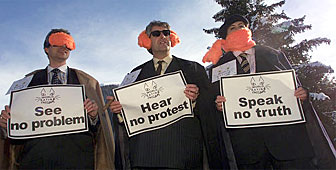Switzerland counts the cost of Davos meeting

Davos is getting back to normal following the end of the World Economic Forum summit. This year's meeting was overshadowed by the controversy over security measures to prevent demonstrations by anti-globalisation protesters.
After the violent clashes between police and demonstrators that marred last year’s summit, Switzerland mounted its biggest security operation since the Second World War to avoid a repeat performance.
Hundreds of police were drafted into Davos and a ring of steel transformed the Congress Hall into a fortress. The authorities also banned demonstrations in the town for the duration of the summit.
But the measures were only partially successful. Several hundred protesters managed to reach Davos on Saturday, but were kept away from the conference centre by police armed with water cannon.
The focus of protests the turned to Zurich, where police fought pitched battles with demonstrators who rampaged through the city, setting fire to cars and damaging buildings. There were also clashes in other cities across the country.
The police operation drew fierce criticism from non-governmental organisations (NGOs), which accused the authorities of turning Davos into a fortress and restricting the right of assembly and freedom of expression.
On Monday, several NGOs present at the summit wrote letter to the Swiss president, Moritz Leuenberger, criticising the scale of the security operation and demanding that the government guarantee the right to hold peaceful demonstration at future summits.
The letter followed comments from the government dismissing criticism and defending the police operation. Leuenberger said the events in Zurich had clearly justified the heavy security in Davos.
The controversy has taken the shine off a summit which was meant to bridge divides between business leaders and their critics. Organisers have put social responsibility at the centre of discussions and insist that they are working to spread the benefits of globalisation.
But critics remain unconvinced, as do some high-ranking international officials such as the United Nations secretary-general, Kofi Annan. He took the business community to task in a special message, saying corporations had to learn how to be better global citizens or the backlash against globalisation would become stronger than ever.
Other issues which came to the fore at this year’s summit were the Middle East peace process and the future of the Balkans.
The Palestinian leader, Yasser Arafat, held talks with a former Israeli prime minister, Shimon Peres, and launched a scathing attack on Israel’s treatment of the Palestinians.
Swiss officials repeated an offer to mediate in talks between the two sides, but in Israel the prime minister, Ehud Barak, made it clear that the peace process was off the agenda until elections, scheduled for February 6, are over.
The Yugoslav president, Vojislav Kostunica, also attended, as did the South African president, Thabo Mbeki, who spoke of new plans to help Africa realise its economic potential.
Discussion of economic issues was largely overshadowed by the debate on globalisation. However, most participants said they were confident that fears that the world was on the verge of a recession were unrealistic.
The deputy managing director of the International Monetary Fund, Stanley Fischer, argued that forecasts for growth in the United States should be downgraded but he said this didn’t mean that the world’s biggest economy was about to enter a recession.
The general sentiment in Davos appeared to be that the US economy was fundamentally strong and should bounce back. Nevertheless, European growth rates may overtake those of the US this year.
by Michael Hollingdale

In compliance with the JTI standards
More: SWI swissinfo.ch certified by the Journalism Trust Initiative
You can find an overview of ongoing debates with our journalists here. Please join us!
If you want to start a conversation about a topic raised in this article or want to report factual errors, email us at english@swissinfo.ch.